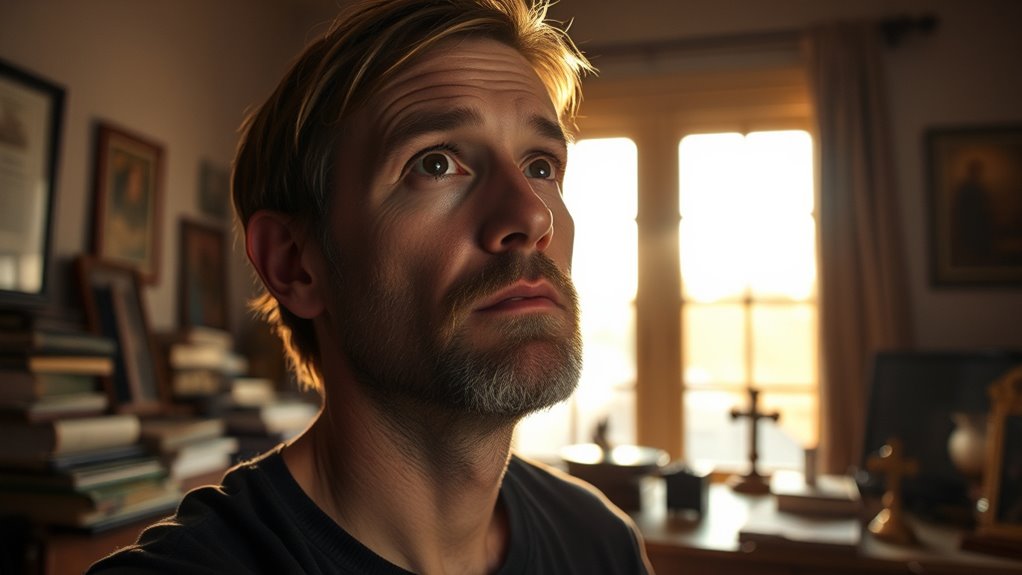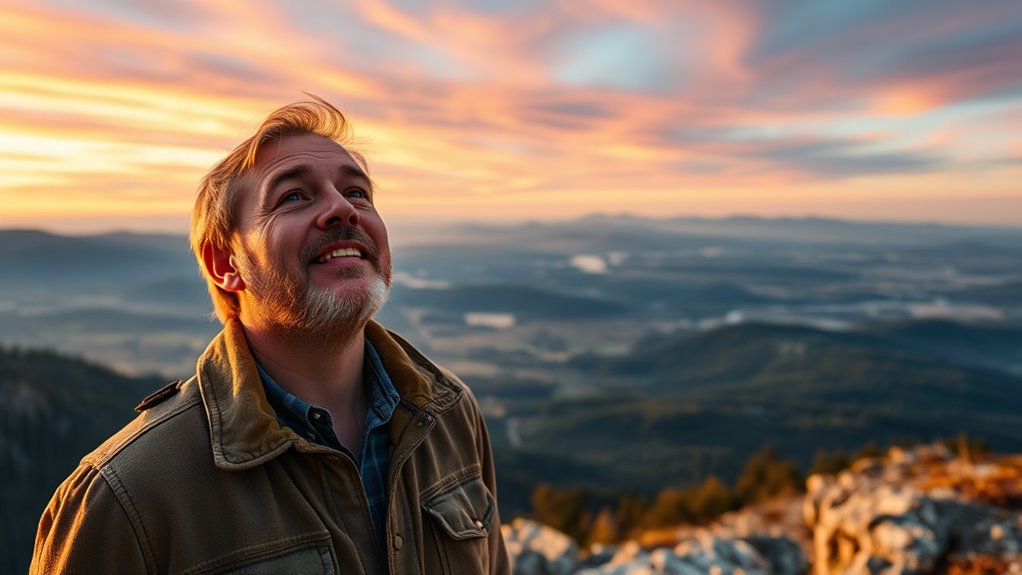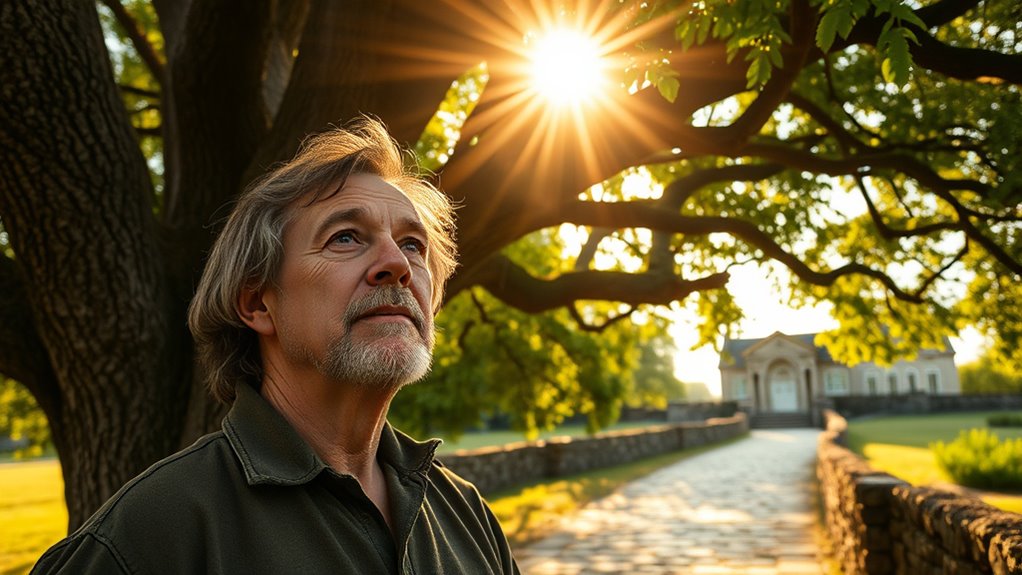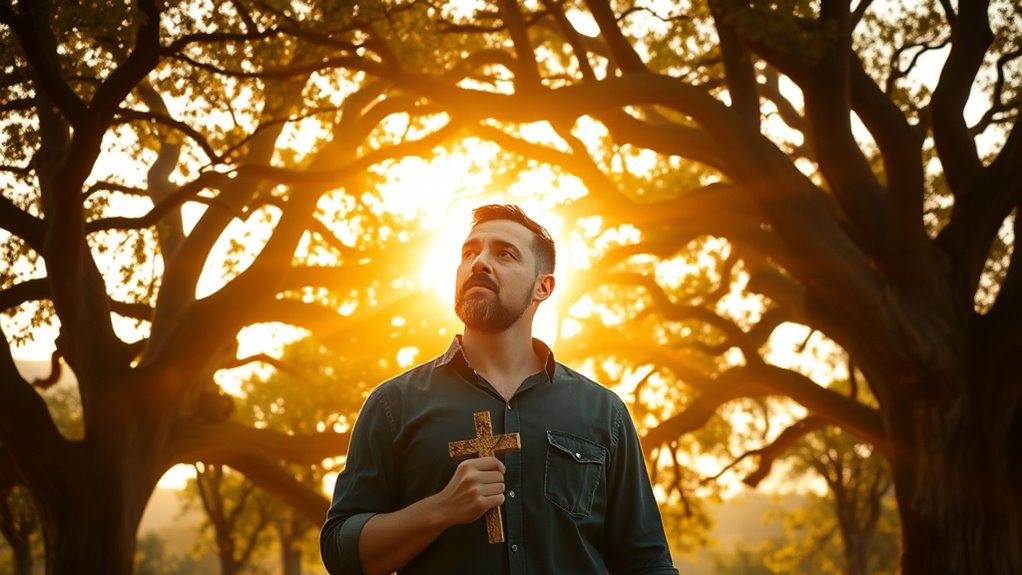John’s journey from atheist to believer begins with his strong skepticism and dependence on facts and logic. Over time, he encounters contradictions, moral dilemmas, and moments of internal conflict that challenge his worldview. Through personal experiences, unexpected signs, and moments of peace, he starts to embrace uncertainty and opens up to the possibility of a higher power. His transformation shows how trusting the process can lead from doubt to faith—if you keep exploring, more details unfold.
Key Takeaways
- John’s skepticism rooted in logic and evidence led him to question spiritual concepts and seek scientific explanations for existence and morality.
- Encounters with contradictions, moral dilemmas, and internal conflicts prompted him to explore deeper spiritual perspectives.
- Personal experiences of divine intervention, such as answered prayers and healing, gradually opened him to faith beyond scientific reasoning.
- Embracing uncertainty and practicing patience helped John develop trust in a higher presence and transition from doubt to belief.
- Ongoing reflection, openness to new perspectives, and letting go of rigid beliefs fostered his spiritual growth from atheism to faith.
Early Life and Initial Skepticism

Growing up, John was naturally skeptical about anything that didn’t fit into his logical framework. He believed strongly in reason and evidence, which kept him distant from spiritual ideas. His moral development was shaped by facts, not faith, and he saw no need for a spiritual awakening. For him, questions about existence and morality had clear answers rooted in science and logic. This skepticism fueled his doubts about religion and spirituality, making him dismissive of anything that relied on faith alone. Yet, beneath his doubts, he sought meaning and purpose, even if he didn’t realize it at the time. His early life was marked by a firm rejection of spiritual concepts, setting the stage for his eventual journey toward belief.
The Seeds of Doubt

As a child, your curiosity about the world sparked questions that challenged what you believed. These moments made you start questioning scientific explanations that seemed incomplete. Little did you know, these doubts would plant the seeds for a deeper transformation later on.
Childhood Curiosity Sparks
Even as a child, John’s natural curiosity led him to question the world around him. He often stared at religious symbols, wondering what they truly represented beyond their surface. At dinner tables, he enthusiastically listened to philosophical debates about existence and faith, sparking deeper questions in his mind. His childhood was filled with moments like:
- Examining stained-glass windows and their stories
- Asking adults about heaven, hell, and life’s purpose
- Watching religious ceremonies with fascination and confusion
- Pondering the meaning behind symbols like crosses and halos
- Debating with peers about what’s real and what’s faith-based
These early experiences planted seeds of doubt, pushing him to seek answers beyond what he was told, igniting a lifelong journey of questioning and discovery.
Challenging Scientific Beliefs
John’s early exposure to scientific explanations often clashed with his innate curiosity about the universe. He questioned how quantum mechanics, with its strange probabilities, fit into a logical worldview. Similarly, evolutionary theory, though widely accepted, left him wondering about the origins of complex life and the randomness involved. These scientific beliefs challenged his assumptions, sparking doubts about whether science could fully explain existence. As he *explored* deeper, he realized that gaps in understanding didn’t mean a belief in the supernatural was invalid, but instead prompted him to seek answers beyond pure science. This internal conflict planted seeds of doubt, pushing John to reconsider whether scientific explanations alone could address the mysteries of life and the universe.
Encountering Contradictions and Questions

When you start exploring your faith more deeply, you might stumble upon questions or apparent contradictions that challenge what you’ve believed so far. These moments are part of faith exploration and often bring spiritual doubts to the surface. You may find yourself questioning old assumptions or struggling to reconcile new ideas. It’s normal to feel uncertain or confused during this process. Recognizing these doubts as part of growth helps you move forward.
Questioning beliefs and facing doubts are natural steps in spiritual growth.
Some common experiences include:
- Conflicting scientific and spiritual explanations
- Inconsistent stories or teachings
- Personal doubts about God’s existence
- Moral dilemmas that challenge beliefs
- Feelings of spiritual emptiness or disconnect
A Turning Point: The Search for Meaning

After facing doubts and questions about his beliefs, you began actively seeking deeper meaning in life. The existence debates surrounding purpose and destiny pushed you to explore beyond surface-level answers. You questioned if life had inherent meaning or if it was something you had to create yourself. This search marked a pivotal point in your faith journey, prompting you to examine different philosophies and spiritual perspectives. You realized that understanding life’s purpose wasn’t about rejecting or accepting ideas blindly, but about engaging with them honestly. Each conversation, book, or reflection brought you closer to clarity. This quest for meaning became the foundation for your eventual transformation, shaping your worldview and guiding your journey from skepticism to faith.
Moments of Reflection and Internal Conflict

As your search for meaning deepened, moments of reflection often brought internal conflict to the surface. You grappled with faith doubt and moral dilemmas, questioning whether your beliefs aligned with your conscience. These moments felt like a tug-of-war inside, where reason and emotion clashed. You faced silent nights pondering if there was a higher purpose or if life was just randomness. Sometimes, guilt crept in over past actions, challenging your moral foundation. You wondered if surrendering to faith meant losing your identity or gaining clarity. These internal battles pushed you to confront fears and uncertainties, forcing you to decide whether to embrace doubt or trust in something greater. It was a pivotal process shaping your spiritual journey.
Influences and Inspirational Encounters

Your journey was shaped by childhood curiosity and the moments that sparked it, leading to life-changing conversations. These encounters, filled with miracles and unexpected signs, played a key role in guiding your path. Together, they form the foundation of your transformation and faith.
Childhood Curiosity Sparks
From a young age, John’s curiosity about the world around him ignited through simple yet profound encounters. These moments sparked his initial philosophical inquiry and planted the seeds for a spiritual awakening. You might picture him:
- Staring at the stars, questioning the universe’s purpose
- Listening intently to stories about faith and wonder
- Reading books that challenged his understanding of existence
- Watching nature’s intricate design unfold before him
- Asking endless “why” questions about life and morality
Each experience fueled his desire to understand deeper truths, setting the foundation for his eventual transformation. These childhood explorations opened his mind to the possibility of something greater, guiding him toward a later spiritual awakening that would reshape his beliefs.
Life-Changing Conversations
Throughout his journey, meaningful conversations and encounters with inspiring individuals played a pivotal role in shaping John’s spiritual path. Engaging in philosophy debates challenged his previous beliefs and opened his mind to new perspectives. These discussions often highlighted the depth of spiritual practices across different faiths, encouraging him to explore beyond his atheism. Conversations with believers and skeptics alike pushed him to question what he truly valued and believed. Each exchange offered clarity and insight, gradually transforming his worldview. These life-changing conversations became catalysts for change, guiding him toward a genuine pursuit of faith. By listening, asking questions, and reflecting, you realize that authentic dialogue can profoundly influence your understanding of spirituality and help you find your own spiritual practice.
Miracles and Moments
Many of John’s most profound moments came unexpectedly, often in the form of miracles or encounters that seemed to defy explanation. These experiences marked pivotal points in his faith journey, sparking a spiritual awakening that shifted his worldview. You might imagine feeling a sudden sense of peace during a difficult time or witnessing an event that seemed impossible without divine intervention. These moments weren’t just coincidences—they reinforced his newfound belief and opened his heart to something greater.
- A stranger offering words of encouragement when he needed them most
- An unexpected answer to a prayer during a dark hour
- Witnessing a healing that defied medical explanation
- A moment of clarity during a quiet reflection
- An inspiring encounter with someone’s testimony
The Role of Personal Experiences in Transformation

Have you ever wondered how personal experiences can spark a profound transformation? These moments often bridge the gap between scientific reasoning and emotional healing. When you face challenging life events, they can challenge your beliefs and open your mind to new perspectives. Personal experiences, like witnessing kindness or overcoming hardship, create powerful emotional connections that stir deep reflection. Such moments can lead you to question previously held assumptions and foster spiritual growth. They serve as catalysts for change, blending rational understanding with emotional healing. Your unique encounters help break down intellectual barriers and invite genuine trust and belief. Ultimately, these personal experiences become the foundation on which your transformation builds, guiding you from skepticism to faith through heartfelt realization.
Embracing Uncertainty and Openness

Embracing uncertainty requires a willingness to let go of the need for immediate answers and accept that some questions may remain unresolved. This openness allows you to explore faith without the pressure of certainty, fostering genuine belief transformation. By embracing the unknown, you create space for new perspectives and deeper understanding. You’ll find yourself asking different questions, more curious than defensive. This process involves patience, humility, and trust in the journey. It’s about recognizing that faith exploration isn’t about having all the answers but about being open to growth. As you embrace uncertainty, you develop a resilient, flexible mindset that supports ongoing spiritual discovery.
- Letting go of rigid expectations
- Accepting ambiguity in beliefs
- Cultivating curiosity and wonder
- Building trust in the process
- Allowing space for growth
The Shift Toward Faith

As you grow comfortable with embracing uncertainty, a natural shift begins to happen within your heart and mind. Your faith journey gains momentum as doubts soften, opening space for belief to take root. This spiritual awakening often starts subtly—moments of reflection, unexpected feelings of peace, or newfound curiosity about spiritual matters. You begin to see signs of connection beyond logic, sensing a presence that offers comfort and purpose. The progression isn’t sudden but builds gradually, fueled by your openness and willingness to explore. With each step, you move closer to trusting something greater than yourself, marking a profound shift from skepticism to faith. This evolving perspective transforms your outlook, guiding you toward a deeper understanding of belief and spiritual truth.
Lessons Learned and Moving Forward

You’ve learned that embracing new perspectives can open your heart and mind to growth. Moving forward, it’s important to stay committed to personal development and remain open to change. What lessons will you carry with you as you continue on this journey?
Embracing New Perspectives
Learning to see things from a new perspective often requires a willingness to challenge your assumptions and let go of old beliefs. Embracing this change is a crucial part of your faith journey and belief transformation. It means opening yourself to ideas that once felt uncomfortable or unfamiliar, and trusting the process of growth. You might begin to notice:
- Questioning long-held doubts and fears
- Recognizing moments of clarity and insight
- Reframing previous negative beliefs about faith
- Connecting with others who share different perspectives
- Finding hope in unexpected places
Continuing Personal Growth
Continuing personal growth requires ongoing reflection and a commitment to applying lessons learned along your faith journey. As you experience a spiritual awakening, you’ll find new insights about yourself and your purpose, fueling your moral development. Embrace opportunities for growth by regularly evaluating your beliefs and actions. Recognize that setbacks are part of the process; use them as lessons to deepen your understanding and strengthen your resolve. Staying open to change helps you build resilience and authenticity. Keep seeking knowledge, nurturing compassion, and aligning your life with your values. Your journey isn’t finished, but each step forward brings greater clarity and purpose, ensuring that your faith continues to shape a meaningful, evolving life.
Frequently Asked Questions
How Did John’S Relationships Change After His Transformation?
Your relationships likely shifted after embracing faith, as you become more connected to a faith community. This new involvement can strengthen bonds with others who share your beliefs, fostering support and understanding. However, it might also challenge existing relationship dynamics if friends or family hold different views. Overall, your transformation encourages you to build deeper, more meaningful connections rooted in shared faith, enriching your social life and personal growth.
Did John Face Any Community Backlash for His Beliefs?
You might wonder if John faced community backlash for his beliefs. The community response varied; some people welcomed his new faith, while others questioned or criticized his change. You could experience a mix of social acceptance and rejection, depending on your surroundings. While some may support your spiritual journey, others might distance themselves. Overall, expect a range of reactions, and be prepared to navigate differing perspectives on your transformation.
What Specific Doubts Challenged John the Most?
Doubts can be like storms on a clear day, shaking your beliefs. For you, the most challenging doubts involved questions about existence and how science conflicts with faith. You wondered if scientific evidence truly disproved God’s existence or if faith could coexist with reason. This inner conflict pushed you to question what you believed and seek answers beyond surface-level explanations, ultimately deepening your understanding of both science and spirituality.
How Does John Practice His Faith Daily Now?
You practice your faith daily by maintaining consistent prayer routines, setting aside time each morning and evening to connect spiritually. You also dedicate time to scripture study, reading and reflecting on passages that inspire and strengthen your beliefs. These practices help you stay grounded, foster a deeper understanding, and reinforce your commitment. Incorporating prayer and scripture into your daily life becomes a meaningful routine that nurtures your faith and keeps you spiritually centered.
What Advice Does John Give to Skeptics Seeking Faith?
Like steering a dense forest, your faith journey can be challenging, but don’t give up. John advises skeptics to seek spiritual guidance with an open heart and patience. Trust that faith develops gradually, much like planting a seed and watching it grow. Stay curious, ask questions, and embrace vulnerability. He encourages you to explore different perspectives, knowing that genuine belief often begins with honest doubt and persistent effort.
Conclusion
Your journey from skepticism to belief is nothing short of a cosmic miracle, transforming doubt into unwavering faith. Embracing uncertainty and seeking answers can feel overwhelming, but it’s in those moments that true growth happens. Just like a tiny seed becoming a mighty tree, your openness has fueled your remarkable transformation. Keep trusting the process, and remember, your story could inspire others to believe in the impossible too. The universe is cheering for your incredible journey ahead.










